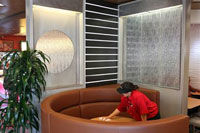加州“麦当劳”也讲“风水”(图)
 加州“麦当劳”也讲“风水”
加州“麦当劳”也讲“风水”The only familiar signs at the McDonald's in California are the golden arches, the drive-through and the menu. Gone are the plastic furniture, Ronald McDonald and the red and yellow palette that has defined the world's largest hamburger chain. Leather seats, earth tones, bamboo plants and water trickling down glass panels have taken their place。
The makeover elements are meant to help diners achieve happiness and fortune -- whether they realize it or not。
That's because the restaurant was redesigned using the principles of feng shui, the ancient Chinese practice of arranging objects and numbers to promote health, harmony and prosperity。
The concept is an unlikely fit with fast food. But the restaurant's owners say the designs are aimed at creating a soothing setting that will encourage diners to linger over their burgers and fries, and come back again。
The makeover is part of the attempt by McDonald's Corp. in recent years to remodel hundreds of its restaurants to attract more patrons with unique decor and amenities。
It also fits into McDonald's larger corporate practice of catering to local tastes, such as a fondue-style burger in France or a pita-wrapped "McArabia" sandwich in the Middle East。
"We can't look too cookie cutter," Mark Brownstein, one of three owners of the restaurant, said about the new decor。
The basic principles of feng shui include placing strategic representations of five natural elements -- earth, water, fire, metal and wood -- around the room to increase the flow of chi, or energy。
Feng shui (pronounced fung shway) has been employed in the designs of high-rises, banks, even zoo exhibits, and has been popularized by countless coffee table books and TV shows. It's also used in the designs of the Panda Express Chinese food chain。
The McDonald's in this Los Angeles suburb boasts wood ceiling, silver-coated chairs, plus red accents throughout the dining area to symbolize fire and "good luck, laughter and prosperity," said Brenda Clifford, who designed the dining area。
如今,在加利福尼亚一家麦当劳餐厅能看到的眼熟标识恐怕只剩下金色拱门、“得来速”和菜单了。这个全球最大汉堡连锁店的标志性特点如塑料桌椅、“麦当劳”叔叔塑像、红黄招牌等通通不见了。取而代之的则是皮沙发、褐色色调、盆栽竹和玻璃水幕墙。
这些新元素的引入是为了给用餐的顾客带来福气和好运——无论他们是否意识到这一点。
这是因为这家麦当劳餐厅重新设计时采用了中国古代的“风水”理念。中国古代根据“风水”来安排物件摆放和数量,旨在给人们带来健康、和谐和兴旺。
“风水”理念与快餐似乎风马牛不相及。但这家餐厅的经理说,采用这一设计是为了营造一种舒缓的用餐环境,让顾客慢慢品尝汉堡和薯条,并成为回头客。
这家餐厅的重新设计是麦当劳公司“重建计划”的一部分。近年来,麦当劳公司对其数百家餐厅进行重新改造装修,旨在用其独特的装饰和设计来吸引更多的顾客。
同时,这也是为了响应麦当劳公司一项更大的战略——“本地化战略”,比如:麦当劳在法国推出了“干酪堡”,在中东地区推出“McArabia”圆面皮三明治。
这家餐厅的三位经理之一马克•布朗斯坦谈到新设计时说:“我们不能过于一成不变。”
“风水”设计的基本原则之一是将象征五行(土、水、火、金、木)的元素置于房间周围,以增加“气”(即“活力”)的流动。
“风水”理念在摩天大楼、银行、甚至动物园的建筑设计中都有所应用,而且在大量“咖啡桌书”和电视节目中都有介绍。“熊猫快餐”中餐连锁店采用的就是风水设计。
这家麦当劳餐厅位于洛杉矶市郊。负责用餐区设计的布兰达•克利福德说,重新设计后的餐厅使用的是木质天花板和镀银椅,另外,整个用餐区以代表“火”元素的红色为主色调,象征“好运、欢笑和兴旺”。
不管顾客是否认出这些“风水”元素,他们对新设计的反应都不错。
- 小萝莉零下25度雪地冲凉水澡(组图)2012-12-29 15:02
- 9岁小萝莉PK吴莫愁翻唱《PRICE TAG》2012-12-27 14:03
- 10岁小萝莉自创《斗妈大全》走红(图)2012-12-26 17:56
- 萝莉最爱:萌死人的小动物们(组图)2012-12-16 14:26
- 被妈妈吃光万圣节糖果 小萝莉反应好萌2012-12-12 16:08
